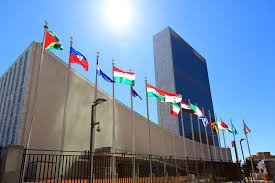Sept. 1—“Secretary of State Marco Rubio is denying and revoking visas from members of the Palestine Liberation Organization (PLO) and the Palestinian Authority (PA) ahead of the upcoming United Nations General Assembly,” the State Department announced in a media advisory Aug. 29. Unnamed State Department officials later informed Israeli media (Haaretz, Times of Israel) that Palestinian Authority President Mahmoud Abbas is on the list of officials to be refused entry into the United States, along with 80 other PA officials,
What justification is given for this outrage? The State Department charges that it is the PLO and PA which are “undermining the prospects for peace.” One condition for the Palestinians to be deemed acceptable “partners for peace,” is that the PLO and PA “consistently repudiate terrorism—including the October 7 massacre—and end incitement to terrorism in education."
The second is that the Palestinians must end all international actions against the genocide their people are suffering, and stop organizing for their right to statehood, because those efforts, Rubio alleges, are the reason there is no peace yet! As the State Department so crudely put it:
“The PA must also end its attempts to bypass negotiations through international lawfare campaigns, including appeals to the ICC and ICJ, and efforts to secure the unilateral recognition of a conjectural Palestinian state. Both steps materially contributed to Hamas’s refusal to release its hostages, and to the breakdown of the Gaza ceasefire talks.”
Israeli Foreign Minister Gideon Sa’ar enthusiastically welcomed the news, Haaretz reported, writing “Thank you, Secretary of State Marco Rubio, for holding the ‘PLO’ and PA accountable for rewarding terrorism, incitement, and efforts to use legal warfare against Israel.”
Such desperate actions may backfire. A showdown over the genocide in Gaza being carried out by the Netanyahu government and the IDF, and its spread into the West Bank, both with United States support, is expected in the UN General Assembly which opens in September. Several European nations have promised to recognize the Palestinian state at that time, and there is a building campaign for the UN General Assembly to bypass the U.S. veto in the UN Security Council through a “Uniting for Peace” Resolution which would mandate emergency intervention to stop the genocide before Israel’s enforced mass starvation kills all people of Gaza.
The State Department tried to cloak its action in legality, by authorizing the PA Mission to the UN to “receive waivers per the UN Headquarters Agreement.” The Palestinian Authority called out the revocation of the visas as a “violation” of that 1947 agreement between the UN and the United States and called on UN Secretary-General António Guterres and the UN Security Council to “carry out their duties.” Haaretz reports that, “according to the 1947 agreement, U.S. authorities are not allowed to limit the arrival of member state representatives or UN officials to the UN Headquarters in New York City. It also cannot impede the arrival of ‘other persons invited to the headquarters district by the United Nations on official business.’”
Haaretz, in and editorial Aug. 29, strongly objected to the U.S. decision to deny entry visas for Palestinian Authority and Palestine Liberation Organization officials. This “is not just another technical step,” it charged. It demonstrates the Trump administration’s “complete delegitimization of the Palestinian leadership and the setting of almost impossible conditions to renew any diplomatic pathway” to end the Israeli-Palestine conflict.
The article raised the precedent of the result of the U.S. refusing to grant a visa for PLO chief Yasser Arafat to speak in December 1988 before the United Nations General Assembly in New York City. "The General Assembly was moved to Geneva by a joint decision supported by 154 countries. Arafat himself noted that the change of location was not a win over the United States, but a win over the international consensus of one-sided aggression.
“The real question, then as it is now, is not if Abbas will speak in New York or Geneva, but if the international community is willing to accede to the American dictates, or stand up for the principle of equal representation of peoples….
“Either way, the Palestinian issue as a whole is currently at a historic crossroads, regardless of whether Abbas and his people will enter the U.S.”




